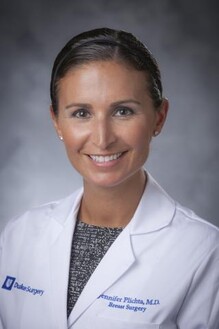Do You Know Your Breast Cancer Risk?
Get a Personalized Breast Cancer Risk Assessment and Screening Plan

Breast surgical oncologist Jennifer Plichta, MD, counsels Shanel Wilson-Poe on her breast cancer risk.
Which breast cancer screenings you should have and when you should have them depends on your risk level. A breast cancer risk assessment can help you determine your risk and your screening plan.
Breast surgical oncologist Jennifer Plichta, MD, of the Duke Breast Risk Assessment Clinic answers questions about breast cancer risk assessment.
What Is a Breast Cancer Risk Assessment?
A breast cancer risk assessment can determine your risk for developing breast cancer and help you identify when, how, and how often you should be screened. It takes many factors into consideration, including your family history and your personal risk factors. For example, your age, race, health, and components of your health history can all influence your risk of developing breast cancer at some point in your life.
When Should You Have a Breast Cancer Risk Assessment?
In general, you should have your risk assessed at age 39 or 40. If you have breast cancer in your family, particularly if your family members were diagnosed at a young age or you have multiple family members with breast cancer, you should be assessed as soon as you become aware of your family history.
What Happens During a Breast Cancer Risk Assessment?
A breast cancer risk assessment will delve into your family and health history. Your family’s history of cancer -- not just of the breast, but all cancers -- is important knowledge for you to share with your doctor. To prepare for your assessment, find out about the types of cancers in your family, as well as the ages at which your family members were diagnosed.
You should also be prepared to share details about your own health history. Factors that influence breast cancer risk include:
- age at start of menstruation
- use of hormone replacement therapy
- radiation therapy
- abnormal breast biopsy
We use this data to calculate your risk of breast cancer. We also use it to make recommendations on next steps. These may include when and how often to have screening mammograms, and whether you need additional testing.
Who Should Perform the Breast Risk Assessment?
Your primary care doctor can perform a breast cancer risk assessment during your annual physical. However, depending on your personal and family history, your primary care doctor may refer you to a breast specialist. He or she can then provide your primary care doctor with a screening plan that’s best for your individual needs.
Why Is a Breast Cancer Risk Assessment so Important?
A breast cancer risk assessment is important because it can identify women who would benefit from additional breast cancer screening. Studies show about one out of every five women who undergo routine screening mammograms fall into a higher breast cancer risk category and may benefit from breast MRIs to detect breast cancer at the earliest possible stage.
Breast cancer risk assessment can also identify women who should be tested for a genetic mutation that increases their risk of developing breast cancer and other types of cancer. Studies indicate that up to 80% of women who have one of these genetic mutations don’t know it. Knowing you have a genetic mutation may impact your decision to opt for preventive surgery -- such as prophylactic mastectomy or removal of your ovaries.




